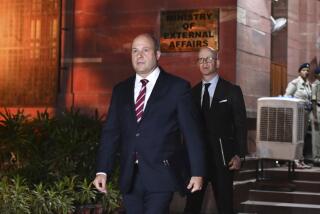U.S. to reopen Canadian’s torture case
NEW YORK — A top Department of Homeland Security investigator said Thursday that his office would reopen an inquiry into the case of a Canadian engineer who was sent secretly by the U.S. to his native Syria for interrogation because of suspected ties to Al Qaeda.
Inspector General Richard L. Skinner, who spoke at a congressional hearing in Washington, said new evidence had emerged that U.S. officials may have broken laws related to torture in the case of Maher Arar.
Canadian officials have said Arar was tortured while in custody for a year in Syria, where he says he was kept for the bulk of the time in a dark solitary cell slightly larger than a grave.
The Canadian government has acknowledged that it supplied faulty information to the U.S., which probably led to his arrest, and neither Canada nor Syria found any evidence of terrorist links. Last year, Canada apologized to Arar, who now lives in Ottawa, and agreed to pay him almost $10 million in compensation.
The apparent mishandling of his case has resulted in a rare public examination of what is known as “extraordinary rendition,” a covert U.S. practice of sending foreign terrorism suspects to other countries for interrogation.
Congressional members called Thursday for a special prosecutor to lead the investigation so criminal charges could be filed.
“Senior American officials ought to go to jail for this,” said Rep. Jerrold Nadler (D-N.Y.), chairman of the House Judiciary subcommittee on constitution, civil rights and civil liberties, who has access to the classified version of a redacted inspector’s general report on the government’s actions. “There was a deliberate plot to abuse the procedures so they could railroad Arar to Syria, where they knew he would be tortured.”
Immigration officials detained Arar in September 2002 at New York’s John F. Kennedy International Airport while he was in transit from Zurich, Switzerland, to Montreal, based on information from the Canadian government.
A four-year U.S. investigation found authorities acted appropriately to deport Arar although normal procedures for deportation were not followed, with a rushed hearing without his attorneys present.
U.S. authorities secretly flew Arar in a small plane to Syria and handed him over with a list of interrogation questions after receiving only “ambiguous” assurances of fair treatment, the report says.
The U.S. has previously said it had independent intelligence that supported the officials’ actions, but it refused to release the classified information.
“I have seen the confidential information, and I can tell you it’s nonsense,” Nadler said. “There is nothing that is incriminating.”
In his testimony, Skinner said it was unclear why the Justice Department overruled the Immigration and Naturalization Service to send Arar to Syria, because his office was not allowed to interview certain officials.
“The INS concluded that Arar was entitled to protection from torture and that returning him to Syria would more likely than not result in his torture,” the report says.
Arar’s attorney, Maria LaHood, said the new evidence, received only a month ago, was an unexpected turn after the four-year inquiry had concluded that the government acted appropriately.
“It confirms that there needs to be a completely independent investigation which has access to all the departments -- the Department of Justice, and Immigration -- and actually release the whole report,” she said.
--
More to Read
Sign up for Essential California
The most important California stories and recommendations in your inbox every morning.
You may occasionally receive promotional content from the Los Angeles Times.










